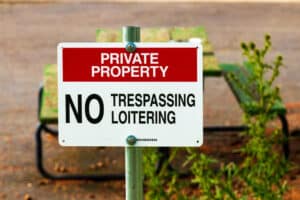Squatters Rights: Adverse Possession in Alabama
In Alabama, property owners may be surprised to learn that under certain circumstances, individuals commonly referred to as “trespassers” can legally claim ownership of their property. To safeguard your real estate, it’s essential to have a clear understanding of squatters’ rights and adverse possession laws in the state. This guide aims to provide comprehensive insights into adverse possession, squatters’ rights, and practical measures to protect your property from potential claims.
Learn more about the history of Squatters Rights by clicking on the link.
Squatters and Adverse Possession in Alabama
Who Are Squatters: In Alabama, a “squatter” is someone who sets up camp on a property without getting clear and legal consent from the owner. Squatters often believe they have the right to be on the property, which can create misunderstandings. They usually move into vacant properties, including homes that have been foreclosed, vacation houses that are rarely used, or properties inherited through wills.
Understanding Adverse Possession: “Adverse possession” is the legal idea that lets squatters become owners of someone else’s property by continuously living there and meeting specific legal requirements. In Alabama, people often use “squatters’ rights” and “adverse possession” interchangeably. Someone who’s trying to get ownership of a property through adverse possession is called a “disseisor.” But there are certain things they have to do before they can claim squatters’ rights and property ownership.
What Squatters Can and Can’t Do: Squatters often move into empty properties because it’s a cheaper way to live. Some may be homeless, while others are regular folks who can afford to pay property taxes and other expenses. Importantly, squatters can’t be prosecuted just for being on the land, even if they don’t damage the property or take anything. If you don’t take action and serve them an eviction notice, they might keep insisting that they’re the real property owners.
Differentiating Trespassers, Squatters, and Holdover Tenants: Alabama’s adverse possession law (Alabama Code Section 6-5-200) means it’s important to tell apart trespassers, squatters, and holdover tenants because Alabama treats them differently:
- Trespassers: Trespassers enter a property without the owner’s permission, even when they’re explicitly told not to. They have no legal right to be there.
- Squatters: Squatters live in a specific area and actively take care of it. They might spend money on property maintenance, cover costs like mortgage payments, rent, and property taxes, all while the deed remains in your name.
- Holdover Tenants: Ever heard of those folks called “holdover tenants”? Well, they’re the ones who decide to stick around in a rental place even after their lease is up. If the landlord gives them the nod, they gotta keep shelling out rent just like they did before, following all the old lease rules. But here’s the kicker: if the landlord drops an eviction notice on them, these holdover tenants gotta pack their bags and hit the road.
Alabama’s Adverse Possession Laws
Strict Criteria: Alabama has some of the toughest adverse possession laws in the country, meaning squatters need to meet specific requirements before they can claim property rights. Here are the key criteria:
- Exclusive Possession: Squatters must show they’ve controlled the property for a minimum of 10 years to be eligible for adverse possession in Alabama.
- Hostile Claim: Possession is considered hostile when squatters know they’re trespassing. But it can also apply when squatters genuinely believe they have a legal right to be there.
- Continuous Possession: Squatters need to continuously and uninterrupted possess the property for at least 20 years in Alabama. They also have to pay property taxes during this period.
- Active or Actual Possession: Squatters must actively maintain and control the property, essentially treating it as their own. This includes basic property upkeep.
- Open and Notorious Possession: Squatters must openly and transparently use the property, not trying to hide their presence. Moving in secretly doesn’t count.
- Color of Title: Squatter laws, like those in Alabama, often involve “color of title.” This means squatters don’t have legal documents like deeds proving ownership. However, if they can show they’ve paid property taxes for ten consecutive years, they might establish “color of title,” potentially reducing the occupancy requirement from 20 years to 10 years.
Preventing Squatting Alabama
Protect Your Property: Preventing adverse possession claims in Alabama is essential for property owners. Here are some steps to safeguard your property:
- Boost Security: Make sure your property is secure with locks, alarms, and surveillance cameras to discourage squatters.
- Pay Property Taxes: Regularly and promptly pay property taxes to show you still own the property.
- Check Your Property: Visit your property regularly to look for any signs of squatters or unauthorized occupation.
- “No Trespassing” Signs: Put up clear “No Trespassing” signs on your property to let potential squatters know they’re not welcome.
- Removing Squatters: If squatters take over your property, follow the correct legal process for eviction. In Alabama, you must treat them as tenants and start tenant eviction procedures.
How Eviction Works Alabama
In situations involving unpaid rent, lease violations, or unlawful activities, landlords can take steps to evict holdover tenants. For issues like unpaid rent or illegal activities, a 7-day notice to vacate the property can be issued.
However, if the squatter refuses to leave after this notice period, landlords must file an eviction petition with a court. It’s crucial to emphasize that the use of force or threats to remove squatters is not legally permissible. Instead, it’s essential to follow the appropriate legal procedures.
When is a Property Considered “Abandoned?”
Squatters often seek shelter in abandoned buildings. In Alabama, a property is typically considered abandoned when property taxes have not been paid for a year or more.
It’s important to note that specific municipalities may have their own definitions and regulations regarding abandoned properties. Therefore, it’s advisable to consult local laws for more precise information on this matter.
Frequently Asked Questions
Are squatters required to pay property taxes in Alabama?
In Alabama, squatters can potentially gain possession of a property without the need to demonstrate payment of property taxes. However, if a squatter can provide evidence of consistent tax payments for ten consecutive years, the required period for adverse possession claims may be reduced from twenty years of occupying and maintaining the property to just a decade.
What is the adverse possession period in Alabama?
To establish a claim of adverse possession in Alabama, a squatter must show a minimum occupancy of 20 years on the property.
Can a squatter claim adverse possession if they have been asked to vacate the property?
No, squatters are obligated to vacate the property when the property owner serves an eviction notice. This action disrupts their continuous possession of the property or land and effectively eliminates any possibility of them pursuing an adverse possession claim.
Can a squatter still claim adverse possession in Alabama if they have been served an eviction notice?
No, if a squatter has received an eviction notice and still refuses to leave the premises, they are considered trespassers and could potentially face criminal charges.
Conclusion
Understanding squatters’ rights and adverse possession laws is vital for property owners in Alabama. Squatters can legally claim ownership of your property if they meet specific criteria, such as exclusive, hostile, continuous, active, open, and notorious possession. Fortunately, you can protect your property by paying property taxes, enhancing security, conducting regular visits, displaying warning signs, and following proper eviction procedures when necessary.
With the right knowledge and actions, you can safeguard your property from potential adverse possession claims and maintain your ownership rights.








